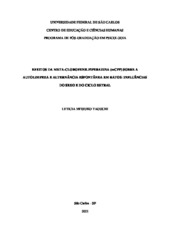Efeitos da meta-clorofenilpiperazina (mCPP) sobre a autolimpeza e alternância espontânea em ratos: influências do sexo e do ciclo estral
Resumo
Obsessive-Compulsive Disorder (OCD) is characterized by obsessions and/or compulsions that cause great suffering to patients. The neural bases underlying OCD need to be better investigated, considering, for example, the existing differences in terms of prevalence, severity, and symptomatology between men and women. In addition, animal models for the study of OCD are not yet well established, with the serotonergic agonist meta-chlorophenylpiperazine (mCPP) being used as a tool in an attempt to explore the relationship between serotonergic transmission and OCD. The present study aimed to compare the basal expression of self-grooming and spontaneous alternation in male and female rats (proestrus/estrus and metestrus/diestrus) and to evaluate the effects of acute or repeated administration of mCPP on these behaviors. For this, male and female Wistar rats (females in proestrus/estrus and metestrus/diestrus) had basal self-grooming and spontaneous alternation compared (exp.1); or received intraperitoneal injection of saline or mCPP (0.1, 0.5 or 1.0 mg/kg) acutely (exp.2) or repeated (exp.3) to assess the effects on these behaviors. No baseline differences were found for self-grooming or spontaneous alternation between males and females or between females at different stages of the estrous cycle. Acute or repeated administration of mCPP did not significantly alter self-grooming behaviors or spontaneous alternation in males or females. In fact, there was only a decrease in self-grooming for females in metestrus/diestrus treated acutely with 1.0 mg/kg mCPP and a significant increase in latency for entries in the alternation test caused by the higher doses of mCPP administered acutely on females in proestrus/estrus and repeatedly on females in metestrus/diestrus. Thus, overall, our results indicate that the natural behaviors of self-grooming and spontaneous alternation in Wistar rats do not appear to differ between males and females or be associated with hormonal changes presented along the estrous cycle. Furthermore, contrary to expectations, mCPP did not exacerbate the self-grooming behavior or impair spontaneous alternation in our study for males or females. On the other hand, the observed effects of mCPP seem to indicate a potential drug-induced motor impairment occurring only on females.
Collections
Os arquivos de licença a seguir estão associados a este item:

